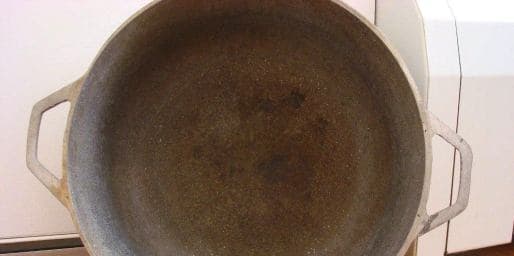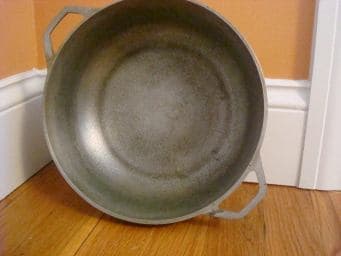
-----
Need help cleaning/polishing aluminum cookware
Q. Hi, the tips for cleaning are welcome.
But, once cleaned, are pots like Magnalite safe to use if they are second hand and the interior is pitted?
Thank you
- Euless, Texas, USA
December 29, 2012
Q. I just received a Magnalite aluminum cast roaster from my mother in law. There was no product literature enclosed. She told me not to worry about the protective film on the inside, but to cook it, empty, in a 300 degree oven. I've done as directed... twice!... but the film has only turned an opaque yellowish color and is now sticky and a little smelly (chemical smell). I'm guessing this film was applied by the manufacturer, even though the roaster did not arrive with any original packaging.
Does anybody know how I should remove this film? Should I cook it at a higher temperature? Or do I want to pull out a disposable scrubber and give some dish soap and elbow grease a try? Or will it take something a bit more industrial than dish soap?
And while I'm at it, once I get the coating off, what are the proper care instructions for a cast aluminum pan? I couldn't find any info on the manufacturer's website.
Thanks!
- Sacramento, California
December 31, 2012
Q. I just bought a Wagner Ware 1911 Aluminum tea kettle that was used as a humidifier. The inside is in very good condition with some light calcium/lime deposits. The surface on the inside is a little textured, not smooth like a cooking pan. Can I use the vinegar ⇦in bulk on eBay or Amazon [affil link] and water boiling method to clean the inside? The pot does not have any pitting and I want to keep it that way. Thank you for your help.
Valarie Seibold- Yorba Linda, California, United States
March 14, 2013
Q. I recently bought two antique hammered aluminum platters that are Farberware limoges. I would like to display them together. One of the platters appears to be cleaner and shinier than the other. How should I clean/shine up the dull platter? Thanks
Charlotte Erickson- North Andover, Massachusetts
September 1, 2013
A. I see that a lot of people want to clean their aluminum pieces of cookware and related pieces. If you are cleaning an aluminum pot or other cooking utensil, you should note that the inside should not be cleaned. The natural oils that have been absorbed into the metal act as a barrier against sticking. If you do scrub it off, it should be re-seasoned to protect against cooking on raw aluminum. If the piece is a serving or ornamental piece which is not in contact with food, it can easily be cleaned with some automotive wheel cleaners which will also leave a protective coating to prevent oxidation.
Robin Thede- Toronto, Ontario, Canada
September 17, 2013
Q. Just acquired a Magnalite pot that was bead blasted with aluminum oxide to remove film that was on it. Scrubbed it with scouring pad and cleaned numerous times with dish detergent but still has film on it. Is there a trick to this? Does it need to be polished?
Neal Trahan- St. Martinville, Louisiana, USA
October 6, 2013
A. The blasting has roughened the surface to the point that a professional polisher with the best equipment will have a hard time restoring it if it can be done at all.
Likely you can buy a new pot cheaper.

Jeffrey Holmes, CEF
Spartanburg, South Carolina
October 10, 2013
Q. I have an Imusa cast aluminum cauldron (caldero) that I used to burn some paper in. As a result the finish inside is ruined and it is discolored.

Can this pot be restored?

Laura Taveras
- Salem, New Hampshire
January 5, 2014
A. Hello Laura,
I had a pot like this that had burnt gravy imbedded in the Aluminum. Try putting the pot on the stove with an inch or 2 of water and a teaspoon of table salt. Boil the salt water for 10 minutes, discard and let the pot cool. This will soften the burned area. Take cream of tartar (grocery store brand) and mix up a paste with warm water. You will want to wear gloves or you will have metallic fingernails! With the bottom of the pot still moist, apply the cream of tartar paste on a scotch brite pad and scour. You will notice a grey foam after scrubbing. You will have to remove a thin layer of the aluminum to get down to clean metal. You may have to repeat the scouring process a few times, but it should work.
Process Engineer - Malone, New York, USA
January 7, 2014
February 1, 2014
![]() It worked as you said.
It worked as you said.

After three 3-oz bottles of cream of tartar and A LOT of elbow grease, I have gotten the pot to a much better place.

Laura Taveras [returning]
- Salem, New Hampshire, USA
![]() Hello Laura,
Hello Laura,
Glad we could help. Bet your wrist and arms are stronger now!
Process Engineer - Malone, New York USA
February 3, 2014
It was pretty intense! I worked on it over a period of a week or so. I left it on the counter w/ the cream of tartar in it and moistened it w/ water every few days when I was in the mood to scrub...

Laura Taveras [returning]
- Salem, New Hampshire, USA
February 5, 2014
Q. I watched a video online that said clean Wagner Magnalite with Zep Purple ⇦[this on Amazon affil links] . I did that and it did clean the inside, a dull finish AND streaks on the outside of the pot! How do I shine everything back to original shine?? Help!!
Elaine Callahan- Nacogdoches, Texas
March 2, 2014
A. Hi Elaine. Zep Purple is a powerful caustic similar to lye; it's for cleaning steel, and is unsuitable for aluminum per the Zep site's FAQs. You should relate your experience to whoever suggested it for aluminum pots and pans.
I'd suggest following Laura's advice. The only labor saving I'd suggest is to get a soft buff for a battery operated electric drill rather than scrubbing by hand. Today's battery drills are dangerously powerful though. Set the clutch lower and preferably use an old 9 or 12 volt drill.
Regards,

Ted Mooney, P.E.
Striving to live Aloha
finishing.com - Pine Beach, New Jersey
Ted is available for instant help
or longer-term assistance.
February 2014
Q. So, just use Cream of Tartar on a little buffing machine? Will this turn it back to shiny?
Elaine Callahan [returning]- Nacogdoches, Texas
March 3, 2014
A. Hi. I don't have Magnalite and haven't encountered the problem personally. But, yes, you'll buff away the aluminum that was oxidized with a buff and cream of tartar. Good luck.
Regards,

Ted Mooney, P.E.
Striving to live Aloha
finishing.com - Pine Beach, New Jersey
Ted is available for instant help
or longer-term assistance.
February 2014
Q. I guess the question I should have been asking is "does aluminum Magnalite have a bright shiny finish to it naturally?" If so, then if I continue to buff the pan, it will be the shiny gloss all over, yes? I do not know if there was a shiny finish put on the outside of the pots and pans or if that was the natural finish of the Magnalite aluminum. Thank you.
Elaine Callahan [returning]- Nacogdoches, Texas
March 4, 2014
A. Hi again. "Shiny" is a relative term. Although pure aluminum can be mirror-polished so perfectly that it's used as a telescope mirror; magnesium oxidizes and turns gray quickly, so this cast alloy of aluminum and magnesium probably will never get mirror bright. But Laura posted before-and-after pictures, and I think that's what you can expect from cleaning old Magnalite at home.
"Magnalite" is also a relative term because it's a trademark and includes pots made in America since 1934, and pots made in China in 2014 -- it means whatever the trademark holder decides it means. We are not trademark attorneys and can't comment knowledgeably, but it also appears that there was/is a trademark dispute, with American Culinary Corp. making "Magnalite" here, and World Kitchens making it in China -- rendering it all even more confusing. If anyone can clarify my poor understanding of the trademark situation, I'd appreciate it.
Look at the Magnalite listings from American Culinary Corp. or World Kitchens to see how shiny it looks when new today, and look at the reviews on Amazon where some people feel the "Magnalite" they bought recently is excellent and others hate it as being nothing like the older pieces they have.
Regards,

Ted Mooney, P.E.
Striving to live Aloha
finishing.com - Pine Beach, New Jersey
Ted is available for instant help
or longer-term assistance.
March 2014
Q. Appreciate your comments. My question is still "using cream of tartar and polishing with a buffer will bring back the "shiny" polish effect on the outside of the Magnalite pan?" Yes or No. Thank you.
Elaine Callahan- Nacogdoches, Texas
March 4, 2014
March 2014
![]() Hi again. It is unlikely that there was ever a shiny coating on that pot, just the aluminum itself -- so again what do you mean by "bring back" the "shiny polish"? Sorry, but my answer remains that shiny is a relative term, not the "yes or no" answer that you keep asking for. Again, please look at the pictures that were suggested and decide for yourself whether they meet your personal interpretation of shiny. Good luck.
Hi again. It is unlikely that there was ever a shiny coating on that pot, just the aluminum itself -- so again what do you mean by "bring back" the "shiny polish"? Sorry, but my answer remains that shiny is a relative term, not the "yes or no" answer that you keep asking for. Again, please look at the pictures that were suggested and decide for yourself whether they meet your personal interpretation of shiny. Good luck.
Regards,
A. This is it, all you really need to know about getting all that burned on grease from Guardian Service -- or any aluminum for that matter...
I got some Gas Grate Cleaner from Sears. It comes in a little packet and you mix the packet with two gallons of boiling water in your sink or a plastic tub. Then you soak your Guardian Service in it. My pot was okay along the top, but along the bottom, it was awful. The directions say to soak the gas grates overnight. I put my pot in about three hours ago, and the water is now cool and very black. When I lifted it to check just now, all the grease just poured off. The pot does not look like it tarnished at all. Will let it soak a bit longer. But just think how this would work on regular gas grates? Drip bowls? Broiler pans? Wow!
If you don't have a Sears nearby, the name of the product again is Gas Grate Cleaner; the package says Made in U.S.A. by Elco Laboratories, Inc. 2545 Palmer Avenue, University Park, Illinois 60466
Part No. SR-100.
It's a wow!
- Emporia, Kansas, United States
July 22, 2012
Q. I have a mudpie cast aluminum serving dish. Someone put it in the dishwasher which removed all the shine. What can I do to get the shine back?
Lucy Jones- Clayton, Georgia, Rabun
August 2, 2012
Q. I have an old Magnalite roaster that I inherited from my mother-in-law. I put it in the dishwasher and now it is pitted. How can I remove the pits and restore the roaster?
Janet Trotter- Martinsville, Indiana USA
August 18, 2014
A. Hi Lucy. Hi Janet. Unfortunately, once it has been through the dishwasher, there is no chemical "undoing" of the etching and pitting that has been created . . .

"The Moving Finger writes; and, having writ,
Moves on: nor all your Piety nor Wit
Shall lure it back to cancel half a Line,
Nor all your Tears wash out a Word of it."
- The Rubaiyat of Omar Khayyam
All that can be done is mechanically repolishing it to make the surface smooth again. If you can get a buffing attachment for your battery operated drill (Mothers' Powerball
⇦ on
eBay
or
Amazon [affil link]
), and some Mothers Mag & Aluminum Polish
⇦ on
eBay or
Amazon [affil link] , though, you should be able to fix it (don't use a plug-in drill or a drill too strong to handle safely & surely). Best of luck and please let us know how you did!
Regards,

Ted Mooney, P.E.
Striving to live Aloha
finishing.com - Pine Beach, New Jersey
Ted is available for instant help
or longer-term assistance.
August 2014
Is the dark deposit on Kenwood attachments that is caused by dishwashers poisonous?
Q. I put my Kenwood attachments into the dishwasher and have now, without realising until too late (I just finished making the cake...) that they have these dark deposits on them. The deposits are described in other posts to your blog, but not whether they are poisonous or not! Is the dark deposit on Kenwood attachments that is caused by dishwashers poisonous? That is, if I used the darkened attachments to mix a cake, is there poison in the cake? Many thanks.
Susan Iremonger- Westport, Co. Mayo, Ireland
August 18, 2014
A. Hi Susan. We have several long threads on here about the safety of aluminum cookware. My personal opinion is that it is completely safe, while some others feel it is unsafe; but safety is a relative thing, and nobody really knows either :-(
Please start with letter 22551, "Is there a danger in Cast aluminum cookware?", which talks about those dark deposits, and form your own opinion from the weight of evidence. Good luck.
Regards,

Ted Mooney, P.E.
Striving to live Aloha
finishing.com - Pine Beach, New Jersey
Ted is available for instant help
or longer-term assistance.
August 2014
Q. Hi, thanks for that suggestion of viewing items under whether aluminium cookware is safe or not. However my question wasn't about that specifically but only about the dark deposits that are on the attachments I put in the dishwasher. I am not asking if the aluminium cookware itself is dangerous itself (I understand that some people think it may be linked to Alzheimers, among other things, but that is not my question). I am really asking what actually are those dark deposits themselves, (not the actual aluminium item), and if these deposits are consumed, could they be harmful? I have read in one of the other posts that they may have copper in them - in which case, I guess they actually are poisonous. Have there been any studies of this? I would really like to know! Thank you for any responses!
Susan Iremonger- Westport, Co. Mayo. Ireland
August 19, 2014
A. Hi again Susan. The referenced thread suggests that these dark deposits are probably aluminum oxide dusts formed by the reaction of the caustic dishwasher detergent with aluminum (which is soluble in caustic); and that the deposit is dark because it is a small porous dust (when a surface is sponge-like, it doesn't reflect the light back and looks black).
I strongly doubt that any epidemiologist ever studied this because it is so hard to exactly define and delimit (realistically, how can you do a controlled study?) but if you can rub any of the dust off, it presumably does increase the quantity of aluminum you might ingest. Rather than trying to find a study on it, I think you should rub off what you can with paper towels and, if you're not making real progress (in other words, the paper towels continue to get gray), then either do the cream of tartar hand cleaning/polishing or the "Mothers" mechanical repolishing.
Some aluminum alloys (depending on whether the pot is cast or otherwise manufactured) might contain a small amount of copper (probably under a half of a percent), but while excess copper is not good for you, copper is not poison, in fact it's an essential nutrient. Best of luck.
Regards,

Ted Mooney, P.E.
Striving to live Aloha
finishing.com - Pine Beach, New Jersey
Ted is available for instant help
or longer-term assistance.
August 2014
Q, A, or Comment on THIS thread -or- Start a NEW Thread